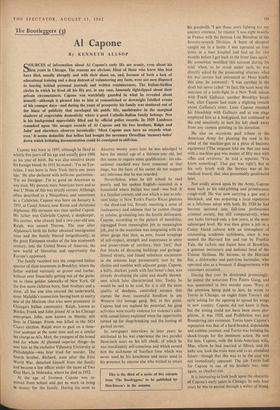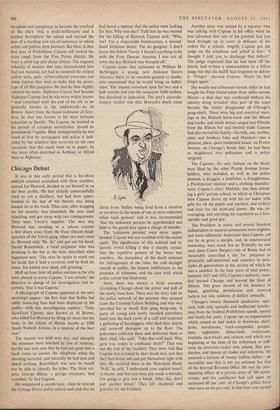The Bootleggers (3)
Al Capone
By KENNETH ALLSOP COURCES of information about Al Capone's early life arc scanty, even about his Ofirst years in Chicago. The reasons are obvious. Most of those who knew him best have died, usually abruptly and with their shoes on, and, because of both a lack of educational training and a deep distrust of volunteering any facts, were not men disposed to leaving behind personal journals and written reminiscences. The Italian-Sicilian circles in which he lived all his life are, in any case, famously tight-lipped about their private circumstances. Capone was watchfully guarded in what he revealed about himself—although it pleased him to hint at romanticised or downright falsified events of his younger days—and during the years of, prosperity his family was shuttered out of the blaze of publicity that enveloped his public life, unobtrusive in the marginal shadows of respectable domesticity where a good Catholic-Italian family belongs. Nor is his background appreciably filled out by official police records. In 1929 Landesco remarked upon 'the meagre records of Al Capone and his two brothers, Ralph and John' and elsewhere observes laconically: 'Most Capone men have no records what- ever.' It seems deducible that bribes had bought the necessary Orweilian 'memory-holes' down which irritating documentation could be consigned to oblivion.
Capone was born in 1895, although he liked to whittle five years off his age and usually gave 1900 as his year of birth. He was also sensitive about his foreign blood. In 1931 he stated: 'I'm no Eye- talian. I was born in New York thirty-one years ago.' He also declared with bellicose patriotism : 'I'm no foreigner. I'm as good an American as any man. My parents were American born and so was I.' None of this was strictly correct. Although often described as a Neapolitan, and sometimes as a Calabrian, Capone was born on January 6, 1895, at Castel Amara, near Rome, and christened Alphonso. His surname was then spelled Caponi. His father. was Gabrielle Caponi, a shopkeeper, His mother, who already had a two-year-old son, Ralph, was named Theresa. The year after Alphonso's birth his father obtained immigration visas and the family filtered insignificantly, in the great European exodus of the late nineteenth century, into the United States of America, the new world of liberation and opportunity for Europe's oppressed.
The family vanished into the congested Italian quarter of slum tenements in Brooklyn, where the father worked variously as grocer and barber, without ever financially getting out of the gutter on to those golden sidewalks of New York. Of the five more children born, four brothers and a sister, all but one also entered the underworld, sister Mafalda's connection having been to marry one of the Maritote clan who were prominent in Chicago's Italian community. Ralph, known as Bottles, Frank and John joined Al in his Chicago', enterprises. John, now known as Martin, still lives in Chicago. Frank was killed in the 1924 Cicero election. Ralph went to gaol on a three- year sentence at the same time and on a similar tax charge as Al's. Matt, the youngest of the brood and for whom Al planned superior things—he sent him to the exclusive Villanova University in Philadelphia—was later tried for murder. The fourth brother, Richard, soon after the First World War, detached himself from the family and became a law officer under the name of Two Gun Hart, in Nebraska, where he died in 1952.
At the age of fourteen Capone was re- moved from school and put to work to bring In money for the family. During his term in Alcatraz twenty years later he was adjudged to have the mental age of a thirteen-year-old, but this seems to require some qualification : his edu- cational standard may have remained at that stage, but the facts of his career do not support any inference that he was retarded.
Nevertheless, when he left school he read poorly and his spoken English—unaided in a household where Italian was used—was bad. It is a familiar context, and one which is just as rele- vant today in New. York's Puerto Rican ghettoes —the dead-end kid, fiercely resenting a sense of inadequency and oddness that he cannot change or subdue, graduating into the hostile delinquent. Capone, according to the pattern of instability, zigzagged from meaningless job to meaningless job,.and in the meantime was integrating with the street gangs that then, as now, found scrapings of self-respect, strength and importance in unity and preservation of territory, their 'turf,' their few blocks of decaying buildings and garbage- littered streets, and found substitute excitement in the tensions kept permanently taut by the clashes and rumbles with adjacent gangs. Capone, a hefty, thickset youth with fast boxer's feet, was already developing the calm and deadly shrewd- , ness which later characterised him. Today he would be said to be cool, for it is still the same quality of deadpan, controlled menace that stamps the most successful hoodlum in any Western city teenage gang. But, at this point, Capone had not realised his potential; his gang activities were, mostly violence for violence's sake, with casual felony exploited when the opportunity turned up for shop-breaking and the looting of parked lorries.
In newspaper interviews in later years he attributed to his war experience the two parallel three-inch scars on his left cheek, of which he was inordinately self-conscious and which earned him the nickname of Scarface (one which was never used by his henchmen and never used in his presence by anyone else who wished to retain
This is the third of a series of five extracts from The Bootleggers,' to be published by Hutchinson's in the autumn.
his goodwill). 'I got those scars fighting for my country overseas,' he related. 'I was eight months in France with the famous Lost Battalion of the Seventy-seventh Division. A burst of shrapnel caught me in a battle. I was operated on four times in a base hospital and laid up for two months before I got back to the front lines again.' He somewhat modified this account during his trial, when, as he stood under oath, he was directly asked by the prosecuting attorney what his war service had amounted to. More briefly this time, he answered : 'I was certified in the draft but never.called.' In fact, the scars were the outcome of a knife-fight in a New York saloon with Frank Gallucio, another Brooklyn hood- lum, after Capone had made a slighting remark about Gallucio's sister. Later Capone resumed his friendship with Gallucio and at one stage employed him as a bodyguard, but continued to the end sensitively to turn his left cheek away from any camera pointing in his direction.
He also on occasions paid tribute to the American Army for planting the seed in his mind of the machine-gun as a piece of business equipment (The sergeant told me that one r an with a machine-gun was master of fifty men with rifles and revolvers,' he told a reporter. 'You know something? That guy was right'), but as his only brush with the Service was- at his medical board, that idea presumably germins ted later.
Not avidly seized upon by the Army, Capone went back to his odd-jobbing and promiscuous rough-stuff. He Was now carrying a gun and a blackjack, and was acquiring a local reputation as a felicitous adept with both. By 1920 he had become initiated into, full-time professional criminal society, but still comparatively, when one looks forward only a few years, at the most submerged level. He was then given a job in a Coney Island cabaret with an atmosphere of resounding academic stylishness, since it was named the Harvard Inn and run by Frar kie Yale, the rackets and liquor boss of Brooklyn, a gunman mercenary and national head of the Unione Siciliana. He became, in the Harvard Inn, a dishwasher and part-time bartender, v ho operated also as a bouncer if disagreements with customers occurred.
During that year he developed promisingly; he joined the notorious Five Points Gang, and was questioned in two murder cases. Wary at the attention being paid to him, he wrote to Torrio in Chicago, an eaglet from Torrio's old eyrie asking for the opening to spread his wings in new country. Capone did not know it then, but the timing could not have been more pro- pitious. It was 1920, and Prohibition was just floundering into existence. Torrio knew Capone's reputation was that of a hard-headed, dependable and ruthless yeoman, and Torrio was building his shock-troops for the imminent action. He sent for him. Capone, with the Irish-American wife, Mae, whom he had married at fifteen, and his baby son, took the train west and to an abundant future—though that this was to be the case was not immediately apparent. The job Torrio had for Capone in one of his brothels was, once again, as chucker-out.
It is interesting to look back upon the obscurity of Capone's early, years in Chicago. In only four years he was to ascend through a welter of blood, slaughter and conspiracy, to become the overlord of the city's vice, a multi-millionaire and a symbol throughout the nation and beyond the seas of a startling new era of autocracy in which crime and politics were partners. But then, in that first year of Prohibition, Capone still looked the slum tough from the Five Points district. He wore a cloth cap and cheap clothes. The unguent urbanity of manner that later characterised him had not matured, nor had he assumed the striped yellow suits, spats, velvet-collared overcoats and white fedoras that were to make him the proto- type of all film gangsters. He had by then slightly adapted his name. Alphonso Caponi had become Alphonse Capone, but he was more widely known —and continued until the end of his life to be generally known in the underworld—as Al Brown: Apart from the hated nickname of Scar- face, he also was known to his most intimate associates as Snorky. The Capone, he insisted in his pursuit of complete assimilation, should be pronounced Capohn. How unimportantly he was rated at first by newspapers and police is indi- cated by the mistakes that occurred on the rare occasions that this name went on to paper; he was more often described as Anthony or Alfred than as Alphonse.































 Previous page
Previous page